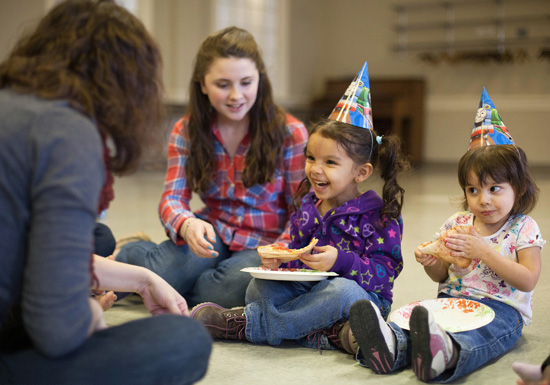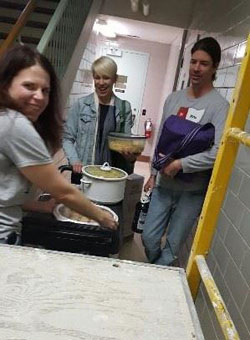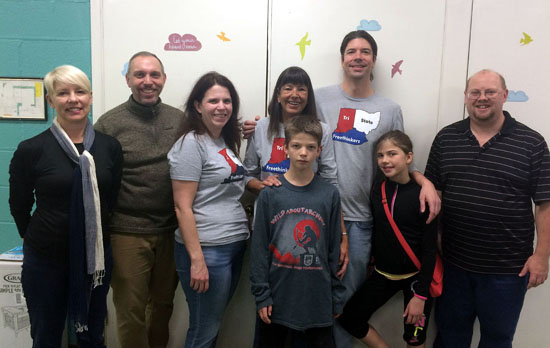6,000 interfaith congregations come together to help homeless families regain their independence
One of the things that drives me is working together to solve problems that affect us all. In the wealthiest country in the world, we shouldn’t have homelessness. Yet this year 2.5 million children will experience homelessness.
Recently, a group I’m involved with, The Tri-State Freethinkers(TSF) connected with the Interfaith Hospitality Network (IHN) of Cincinnati (known nationally as Family Promise) to help host homeless families. Family Promise is a national organization that works to help people gain “sustainable independence” including permanent housing. Various congregations in Cincinnati host families overnight with help from local volunteers who help prepare food and entertain. TSF hosted a group overnight at Pleasant Ridge Presbyterian Church.
What’s involved with hosting families?
Cooking dinner. Playing games with the kids after dinner. Helping folks with anything they need at the church. We cooked spaghetti and salad and garlic bread and homemade croutons and brought games for entertaining after dinner. Pleasant Ridge Presbyterian set up sleeping quarters for everyone and one couple stayed with folks overnight in case they needed anything. Hosting has been done at churches, synagogues, mosques, temples, schools, hospitals, and other community spaces. The idea is to use available community resources to solve temporary housing needs (while working with families and the community to find sustainable housing).
It’s really pretty easy.
We hosted four families (four women and eight kids). One of the things that surprised me was learning how many families and kids are without homes. It’s absolutely heart-breaking. So as not to stigmatize any of our guests, I won’t print any names or show any pictures of the folks we hosted.
After dinner, we found some Play-Doh for the younger kids and we played King of Tokyo with the older ones. All in all, a fun evening and I think it gave their parents a little time to relax. Georgine Getty, our local IHN contact said, “My favorite moment was that we had THREE generations of volunteers! Mary Kay must have raised Jim right because he’s paying it forward to Kelly & Grover. Families helping families—that’s SO IHN!”
I think it’s one of the best interfaith initiatives I’ve seen. Our contact here in Cincinnati put me in touch with Claas Ehlers, president of Family Promise, because I wanted to know how it got started and how they involved so many people.
It’s a broad range of families that are experiencing homelessness
Claas explained that one of the things they try to do is raise awareness of homelessness (what it is and what it isn’t). The simple fact is that there is a lack of affordable housing in this country, especially for low-income families. There is no state in the US where a full-time minimum wage worker can afford a one or two-bedroom apartment at fair market price. Many of those served by Family Promise are working families who cannot afford housing. And often, families that are housed but living paycheck to paycheck become homeless due to one catastrophic setback: an injury on the job, a child’s illness, a divorce, even a cut in hours.
In many cases, it’s easier for people to give up their housing than it is to give up their car. Because you can’t give up your car. If you give up your car, you can’t get to a job, you can’t get to the grocery store. One of the problems though is that once you get into a hole like this, it’s really hard to get out.
If you’ve been to a McDonalds or been to a Walmart you’ve likely seen families who are homeless and not even known it. The homeless are still families. They’re just families without a permanent place to live.
The lack of permanent stability, however, has a devastating effect on the kids. When you can only focus on getting through the current day, it’s virtually impossible to teach kids any of the skills they need to survive (much less advance) in society.
Communities have the resources to address homelessness
Family Promise was started in New Jersey by Karen Olson after she bought lunch for a homeless woman. After listening to the woman’s story, she started to understand how disconnected she was from society and as a result, she started delivering lunches to the homeless. Then, she reached out to the religious community and started bringing the homeless together with people who wanted to help. She realized existing community resources could provide shelter and meals. This was how the first interfaith hospitality network opened in 1986.
The more congregations that are involved, the more resources and volunteers are available and this helps to keep costs down. It also creates a community. In order to be successful, what they realized that what’s most important is a community of caring adults. One of the things Claas said he often hears from families who’ve been helped is, “so many people cared.”
What this also does is help turn people into advocates for low income families. You start thinking about things that so often we take for granted like, is public transportation available? Does the bus run after 8 PM at night? Who else do I know that might be able to provide some help? Dentists? Job training? Childcare?
In addition, many of the volunteers are children themselves. The program helps expose kids of volunteers to helping others and to kids who are a lot like them, just without a home.
Since the program’s start, Claas explained, they’ve helped over 650,000 people (53,000 just last year). 60 percent of the people they’ve helped have been kids. When kids are in crisis, we need to act as a community.
Interfaith
Family Promise is a great example of bringing people together for a common cause. I love that they have so many diverse groups helping. Claas explained that the program started with 10 churches and a synagogue and now engages 170,000 volunteers and more than 6,000 congregations across 42 states. This includes a Mosque in Las Vegas and a Buddhist temple in Hawaii.
We hope to continue to help as an atheist group.
Jim G. Helton, President of the Tri-State Freethinkers said about the program, “When it comes to ending homelessness, we all agree this is the right thing to do. This is why we like this program so much, it allows us to put aside our differences and work together to help those in need.”
What we’ve found is that we all tend to share far more in common in terms of values than we have differences. All of us seem to believe, for example, that we have a duty to help those in need.
We’d like to thank Claas and Karen and Georgine and Pleasant Ridge Presbyterian Church and everyone else involved in Family Promise for running such a wonderful program that brings people together to find sustainable housing for the homeless.
How can people get involved?
If you’re interested in volunteering, you can contact a local affiliate in your area. If you don’t have an affiliate in your area, you can contact Family Promise for information about starting one. If you just want to donate or find out more information about the organization including some of their other programs (family mentoring, education about homelessness, helping homeless families keep pets), please visit their website.
Cross posted at Daily Kos.













